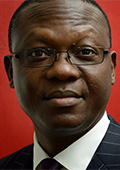As Nigerians boost domestic food production, they talk of making agriculture 'the new oil'. Agrochemical producer Candel is an important part of this process, and moving to the Lekki Free Zone (LFZ) is central to its strategy of becoming an international player with Nigerian roots.
Editor's choice
Candel has been in business for 23 years and describes itself as a “value chain player” in west African agriculture. It began as a producer and distributor of agrochemicals, importing concentrates and then formulating, bottling and distributing the products locally.
Advertisement
It has since expanded into seed and fertiliser production, and has developed its own specialised fertiliser and protection product for cocoa, CocoBoost. Candel’s next step, possibly in 2016, will be to move down the value chain by buying farmers’ output and moving into the grains trading market.
“Most farmers have no money for marketing, no marketing information, and they don’t know what to do,” says Candel founder, owner and chairman Charles Anudu. “This could give them financial inclusion. They are considered bad risks by lending banks because there is no line of sight to an off-taker for their output. So if we do this it will activate the entire value chain.”
Candel has 220 employees and annual sales of some $60m, with 22 offices in Nigeria and another six in Ghana. It has strategic alliances with international manufacturers including the US’s Monsanto (as the local distributor for Roundup herbicide), the UK’s Omex Agrifluids and Spain’s Sanz Hermanos.
Along these lines
In Lekki, the infrastructure is in place. Elsewhere, companies have to provide their own power
Candel has built a plant in the LFZ, where it formulates and bottles imported ingredients. Two production lines are active, with another three about to come on stream. The plant has a bottle-making unit, and will be expanded over time to include another 10 production lines. The company headquarters will relocate there in 2017.
Advertisement
For Mr Anudu, some of the zone’s key benefits are non-financial. He points out that suitable factory locations in Nigeria are relatively few, since non-urban land in the country is usually community owned. “[In Lekki], the title is clean and the infrastructure is in place,” he says. “Elsewhere, companies normally have to provide their own power, their own water, their own security.”
The prospect of bringing in expatriate staff with relative ease is attractive for Candel, as is being part of a growing manufacturing cluster, increasing the likelihood over time of finding suitable manufacturing workers in the area.
Tariff-free trade will also play to Candel’s advantage as it expands its regional market. “The LFZ is a game-changer for us, speaking to our strategy of being a domestic player in west and central Africa,” says Mr Anudu. Nigeria is close to markets such as Cameroon, Gabon and Angola, whereas his Chinese competitors “have to come round the Cape [of Good Hope]”.
The speed with which a formulation gets to the farmer is important, so Candel wants to use its proximity to the market to serve more European multinationals and traders by manufacturing and delivering products that are currently produced in China. “There are now French products being made in China and sold into west Africa,” says Mr Anudu. “I would like a piece of that action.”
